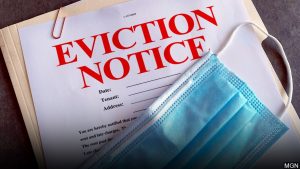 As readers of this blog may be aware, the events of 2020 and 2021 relating to the COVID-19 pandemic have had a significant effect on the status of landlord-tenant actions in New York State. By a series of executive orders, then-Governor Cuomo stayed evictions from taking place in New York State, with the last extension of the eviction moratorium to end as of August 31, 2021.
As readers of this blog may be aware, the events of 2020 and 2021 relating to the COVID-19 pandemic have had a significant effect on the status of landlord-tenant actions in New York State. By a series of executive orders, then-Governor Cuomo stayed evictions from taking place in New York State, with the last extension of the eviction moratorium to end as of August 31, 2021.
Mr. Cuomo, however, is no longer governor of the State of New York. Due to a series of scandals involving alleged sexual harassment, as well as his handling of nursing home patients infected with COVID-19, he resigned from his position as of August 24, 2021, and was replaced by Lieutenant Governor Kathy Hochul.
Governor Hochul, shortly after taking office, decided to take definitive action regarding the soon-to-be-expiring eviction moratorium. She called a special session of the New York State Legislature, with the express purpose of extending the eviction moratorium. As a result, the eviction moratorium in New York was extended through January 15, 2022. However, due to a recent United States Supreme Court decision, landlords are permitted to have their day in Court to challenge a tenant’s claim that their ability to pay their rent was adversely affected by the COVID-19 pandemic.
Under the expired moratorium, if a tenant filled out a form requesting a delay of their eviction, that stay was automatically granted, and the landlord had no recourse to challenge the tenant’s assertions. The renewal of the law, which is called the “COVID-19 Emergency Eviction and Foreclosure Prevention Act of 2020,” or CEEFPA, for short, allows landlords a hearing in which to rebut the tenant’s allegations, which could, in some cases, allow the tenant to be evicted, regardless of the moratorium.
Another issue which has arisen is who is legally defined as a “tenant”, and is thereby protected from eviction under the terms of CEEFPA. A prior blog post discussed situations in which a person occupies a dwelling space, but is not a tenant in the traditional sense, in that they may not have a lease, either oral or written, and are not responsible for paying any rent. Such situations may occur when a family member, who owns a property, allows another family member to live at the premises, rent free. Another situation would be an unmarried couple, where one individual owns the premises, and the other does not. If the couple breaks up, the “owner” may then seek to evict the “non-owner,” even though there is no formal landlord-tenant relationship between them.
Finally, there may be occupants of property who remain after a foreclosure action. For example, a homeowner’s property is foreclosed by their lending bank. After a foreclosure sale, the bank takes title to the property, and wants the now-former owner to vacate. Is that person a “tenant,” protected from eviction under CEEFPA?
Recent judicial decisions from Nassau and Suffolk County would seem to indicate that in the situations discussed in the prior two paragraphs (evictions of family members and evictions of former owners of foreclosed property), the occupants may not be protected under CEEFPA. The Courts in those cases ruled that if the person against whom a warrant of eviction is sought is not responsible for paying rent, then they would not technically be considered a “tenant” under CEEFPA, and could be subject to immediate eviction, assuming the other legal requirements are met.
Our firm is continually monitoring all Court decisions regarding evictions under CEEFPA, and encourages both property owners and occupants to consult with experienced counsel regarding this evolving area of the law.
 New York Real Estate Lawyers Blog
New York Real Estate Lawyers Blog

